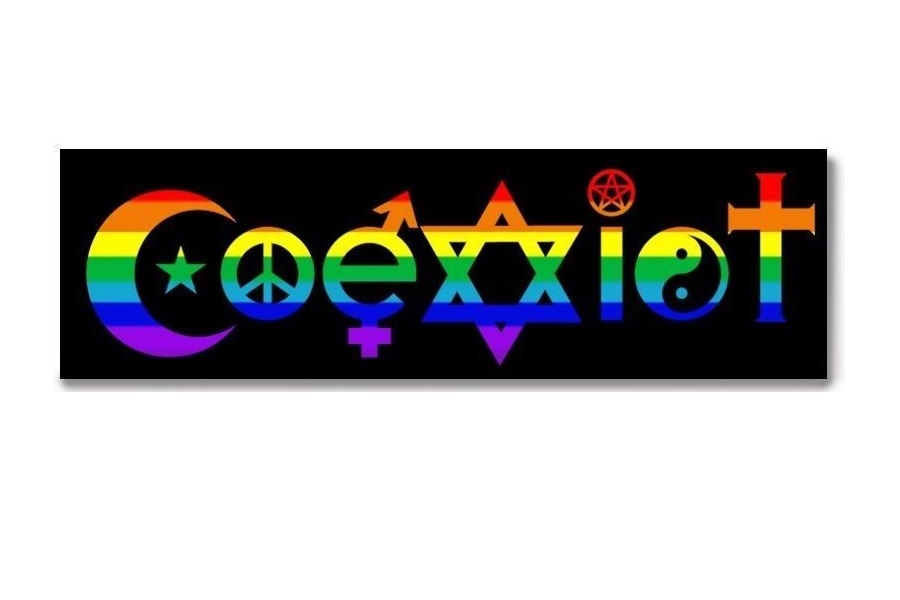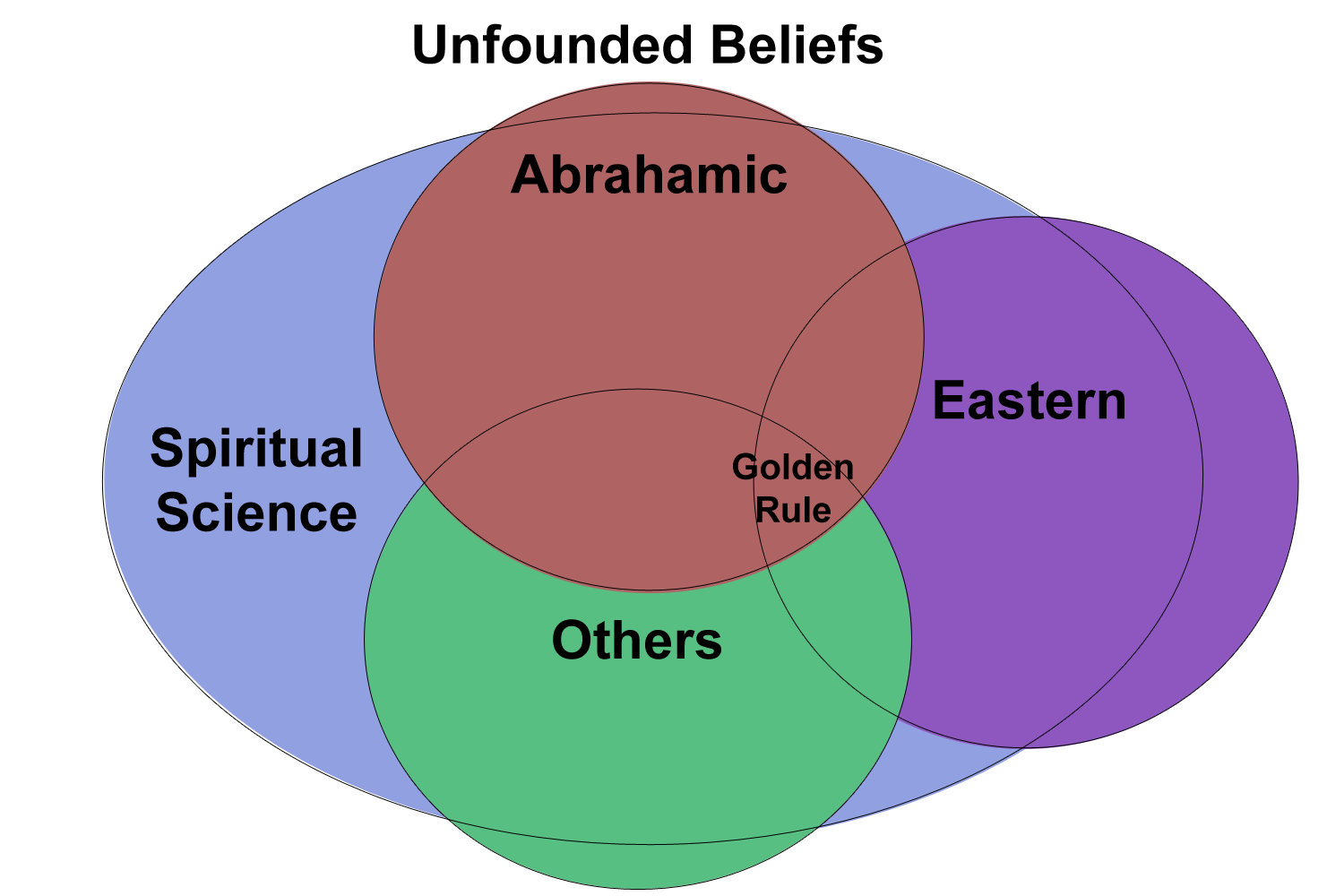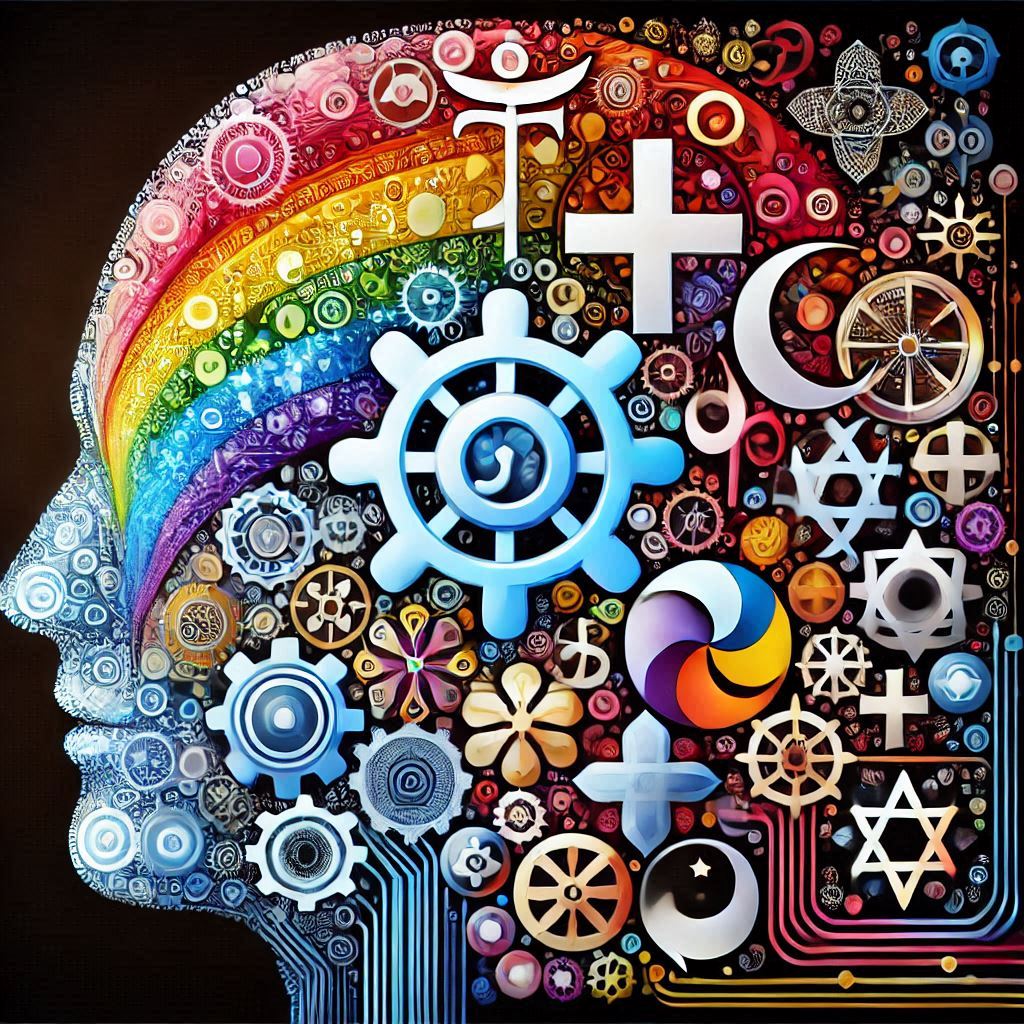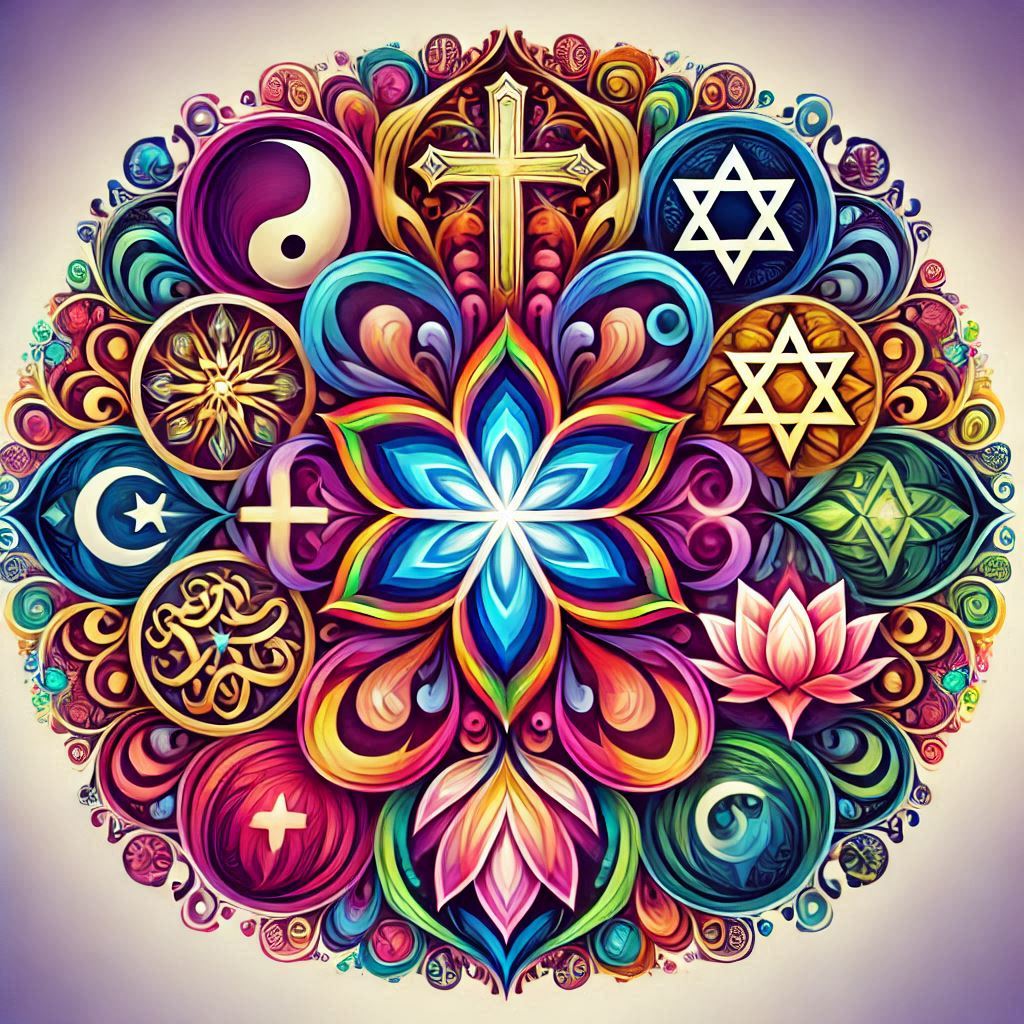Religion

Religion is spiritual belief in practice. Those that share a common belief system will express those beliefs in their traditions, rituals and worship practices. This inevitably leads to the creation of institutions and dogma. Is it possible for these things to be self-correcting?
“I don’t believe in God.”
“You’re a rabbi, how can you not believe in God?”
“It’s what’s so great about being Jewish. You don’t have to believe in a God per se, just in being Jewish.” -Paul Beatty, Tuff
No such traditions exist for those with a secular mindset that don't connect with the symbolism of spirituality. But since tradition and ritual are integral to culture, it is necessary for metaculture to develop traditions and rituals that can reinforce modern values like freedom, reason, science, equality, etc.
In order to remedy this situation, the first step is to enumerate all of the functions that religion serves in our society and personal psychology, in order that we can find secular analogs for each that can perform the same function, or improve upon them.
Essential Components of Religion
Fully fledged religions have some variation of most or all of these concepts:
- A god or a god concept
- A creation story
- An apocalypse story
- Cultural history
- A system of ethics
- Enforcement of taboos
- Rituals to reinforce values and celebrate life's milestones like birth, coming of age, marriage and death
- A metanarrative that provides meaning, context, and easy transmission of a culture's most critical beliefs
metaculture provides a framework for all of these things in order to fully serve the social and psychological functions of religion without contradicting the rational, materialistic view of the universe. It doesn't offer its own set of rituals or a liturgical calendar, but it provides a model for how any person or organization can adopts one that is compatible with science and a secular mindset, while avoiding high-control, authoritarian pitfalls that plague religious communities.
The goal is not to establish any kind of organization around this practice, but to demonstrate what a fully secular analog to religion would need to encompass. Individuals are free to adopt it, or use it to help interpret their own cultural traditions in the light of science, or create their own New Religious Movement that borrows from it and other traditions they identify with. The wiki is here to help organize and share ideas, and demonstrate the universalist compatibility of all religions with each other and with science as a principle that we all need to share, or else.

Neurotheology
Modern neuroscience research has provided significant evidence for the innate desire for religious experience and expression. This field of research is called neurotheology and one of its biggest advocates is Andrew Newberg who has written several excellent books on the relationship between spirituality and the brain, and his interviews [1] [2] on the Armchair Expert podcast are a great introduction to the subject.
metaculture approaches spirituality from a similar perspective. It is a natural, emergent brain phenomenon that is a product of our evolution and the mechanism by which we expand our in-group identities to build large cooperative societies that increase the happiness of everyone. Like any powerful psychological tool, it can be used to build people up to ecstatic emotional heights, or as a tool for authoritarian control.
The ultimate purpose is to find an emotional truth, not necessarily a rational one. The language of religion is inspirational and poetic, not logical or evidence-based. However, these allegories point to underlying truths about the ways our brains and our societies work resulting from millennia of meme-based genetic learning algorithms that led to modern culture.
Modern science is finally catching up to spiritual traditions, allowing us to see the psychological and sociological effects of our beliefs and rituals. While this demystification process may be scary to those who prioritize their faith in the supernatural over the ethics and life choices those beliefs are meant to inspire, anyone who actually learns how it all works will tell you it only deepens the inspiration and wonder that they draw from it.
What are the evidence-based best practices for religion according to science? That is the question metaculture attempts to answer.
This essay by Bobby Azarian does a great job of describing the approach to religion being taken on this wiki.
How Do I Know What You Know?
Religion is a shortcut to knowing what is in another person's mind. If another person identifies with your religion, there are hundreds of stories, doctrines, and ethical allegories (known as "canon") that you can assume they are familiar with. You can then make references to these in conversation without having to explain them to be understood. Eventually, the familiarity with scripture is so great that only chapter and verse numbers are necessary for the most important concepts.
This facilitates extremely efficient communications, in-group affinity, and the ability to establish the trust needed to do business with strangers. Before the construction of ancient cities, this type of shorthand was not necessary since everyone you interacted with was part of your tribe.
The dilemma we now face is that the Internet has created a globally connected society where we could be communicating with someone from any religion or educational background at any time. How can we determine if they are trustworthy? Given the level of grift in modern capitalism, this is an increasingly important question!
But beyond trust, there is the terrible inefficiency of having to determine if someone has a basic understanding of high school science and math before you can engage in a productive conversation about anything of importance. This causes writers to have to explain the same core concepts over and over again, contributing to information overload and causing people to tune out important ideas.
Just as any believer in Christianity should be familiar with the Sermon on the Mount and the Ten Commandments, we need to be able to assume that any graduate of our modern educational system is familiar with fundamental concepts like evolution and the laws of physics, upon which all conversations about science are founded (fractal geometry should be in that list as well!). We need to be able to refer to them by chapter and verse, without having to explain, and everyone knows exactly what we mean.
One of the best illustrations of this principle is the Star Trek The Next Generation episode "Darmok" that depicts an attempt to understand an alien race whose language is highly allegorical. Without understanding the stories they reference, they can't understand each other. Religion functions much the same way.
This video has a great explanation of these themes.
Some clips from the episode.
Religion as the Human Operating System

While comparisons between the workings of the brain to those of a computer have often led to bad psychology, the metaphor is still quite useful for understanding the relationship between our brains and our conscious experience. Just don't take it literally.
If you think of the brain as the hardware in the human computer, and our learned skills and habits as the software, our belief systems are the operating system.
Apparently Ayaan Hirsi Ali has also made this comparison, but this edit was made as soon as this connection was brought to light. This wiki has no original ideas, only an original network of connections between them. Parallel thoughts are proof of patterns not plagiarism.
Let's Stretch This Metaphor
In computers, the operating system is how software interfaces with hardware. It provides an easy, common interface for all software developers to access inputs from scanners, microphones, keyboard, mouse, etc., and outputs like the screen, printer, and network. As software grows more complex, the operating system needs to be upgraded to handle it--from 8-bit, to 16, 32 and 64-bit. Of course, the human CPU can't be upgraded, but for the purposes of this metaphor we can assume that the brain has always been a highly parallel 64-bit platform with terabytes of RAM, and we just need to install the OS upgrades that allow us to take full advantage of this.
Technically the OS is also performing the duties of the compiler in this metaphor, if you're going to be a stickler about accuracy in allegory.
In culture, a shared religion provides the common interface that authors, poets, teachers, and leaders can use to create the ideas that lead us to action. It allows them to easily tap into our deep, primal emotions by using well-known concepts that are tied to ritualized reinforcement. This has both advantages and disadvantages, as history has shown.
Modern times have proven that not having a shared operating system has a very negative effect on human happiness. This is understandable from the programmer's point of view. Imagine if every program you wrote had to include its own custom hardware drivers! Or, you are forced to use the drivers that come bundled with Christianity, Islam, secular humanism, etc., and if the end user isn't running that OS it's up to them to write their own port regardless of their coding prowess.
The Cultural Cross-Compiler
Programmers solved this problem by creating the cross-compiler, allowing software developers to write code that can be run on multiple operating systems without having to make extensive changes for each one. Java is an example of this. Java code can run on Windows, Mac, Unix, Linux, Android, iOS, and everything else out there. Without Java it would be impossible to write any useful software for the Internet, since there are hundreds of different operating systems that need to run it and no single tech giant, let alone programmer, could ever port their code to all of them. If your project requires you to create a new operating system, one of the first things you do is create a Java compiler so you can run everything that already exists on the Internet.
The proliferation of New Religious Movements globally is similar to the proliferation of new devices and operating systems in the technology sphere. Developers of human software used to be able to target a single OS like Christianity and know that it would run on the vast majority of devices, at least the ones they knew about. Until recently, it was fairly easy to get global market share by writing a couple of quick ports to Judaism and Islam, since they have a similar architecture to Christianity. But with people abandoning monotheistic traditions in droves, and no shared canon of scientific knowledge and perspectives to draw from, humanity is in desperate need of mental Java.
Java for the Mind
metaculture is Java for the mind. Open source, compatible with all platforms. You run whatever OS you like, code in whatever IDE you are comfortable with, metaculture will make sure it runs on every device.
Version 4.0 Release Notes
Each major upgrade to religion throughout human history has been a response to advances in technology that profoundly changed the structure of our society.
- Version 1.0 - tribal hunter gather societies developed animism.
- Version 2.0 - the development of agriculture and permanent cities led to polytheism.
- Version 3.0 - the growth of ancient empires led to monotheism.
- Version 4.0 - the connected global society that science and technology has created requires a shared language for cross-cultural understanding--metatheism.
The level of consolidation in religion mirrors the consolidation of our human communities. The bigger our community, the more types of people we must interact with regularly, the more generalized our concept of god becomes. Dispersed, unconnected tribes are like animism where every being is its own god. The collection of city-states in ancient Greece emulates their polytheistic pantheon of gods. And when Rome conquered Europe and the Mediterranean, a consolidated, monotheistic god emerged that reflected this new social order.
It is inevitable that a new, universalist concept of god will emerge now that we live in a globally connected society.
Evolution of Religion

Throughout history, the traditions of one culture have been coopted and repurposed by the next. Saturnalia becomes Christmas once the Roman Empire becomes a Christian state. This makes sense from a psychological perspective since it is much easier to redirect an existing habit than to form a new one from nothing.
Christmas has already been coopted again by the god of capitalism, and as such it should be embraced. Rather than being a selfish perversion of the teachings of Jesus, it can be a joyous celebration of all the wonderful stuff that capitalism is so good at producing. This is simply acknowledging the evolution in meaning that the Christmas holiday has already undergone.
This is the nature of rituals. They evolve and change their meaning with the tide of history. Old traditions become new by taking on new meaning imbued by future generations. Rarely are they simply made up out of whole cloth, and when they are it's more likely to become a cult than a religion.
As old religions evolve and New Religious Movements continue to proliferate, we need to ensure that this process does not fracture and divide humanity. It can be a way that each of us can express our individual identity, culture, connection to history, and love of our fellow humans, or it can be a way to divide us into smaller and smaller in-groups until it becomes our small circle of true believers versus the world. A metatheology is necessary to make it easy for people to identify those movements that will lead to positivity and growth and avoid high-control groups regardless of their ideology.
Updated Ethics for Modern Techno-Capitalism

Modern mental software development has lagged far behind the developers of actual software, who have launched many new information platforms that have taken advantage of known exploits in the 3.0 operating systems to perpetuate grift through misinformation and malicious algorithms.
The 4.0 update will include built-in firewall and auto-updating virus protection to guard against the types of grift we see in an Internet-connected, global, capitalist society. It will do this by providing clear ethical guidelines that apply directly to issues of modern capitalism and democracy instead of leaving it up to the interpretation of ancient scripture. And the guidelines will be open source and regularly updated using the latest scientific consensus, ensuring that new exploits are patched as quickly as they are discovered.
For example, a clear moral directive of "pay your taxes" provides a much more direct and unambiguous message than "render unto Ceasar," which has not always provided sufficient ethical persuasion to prevent rampant tax avoidance.
Even though our emotions and intuitions form the basis for our ethical compass, the complexity of modern capitalism and diversity of the misinformation and grift we must deal with necessitates a trusted authority that can be relied upon to provide clear ethical guidance.
Good Religion, Bad Religion

With so many religions out there, and so many different ways of practicing and interpreting scripture within each of them, how can you tell whether your religious group is a "good" one?
In general, the degree of authoritarian control exerted within the group by its leaders and members is the key meterstick for assessing the quality of a religious institution.
Hassan's BITE Model of Authoritarian Control is widely considered the standard for determining how controlling any group is, measuring four categories of control--behavior, information, thought, and emotions.
"Bad" religion exerts high authoritarian control, be they a traditional cultural institutions, New Religious Movements, or even a social club.
The Freedom of Mind website has many resources for helping any person, friend, or family member that has become involved in a high control group.
In a global society, universalism is a necessary component of being a "good" religion. Anything less is inherently divisive and runs contrary to the spiritual goal of "peace on Earth" common to every faith.
Separation of Doctrine and Institution

In order to achieve the goal of creating a Dogma of No Dogma, it is necessary to create a balance of power between scripture and the institutions created around it. When a belief system is tied to an institution, there are strong incentives to promote interpretations that favor the established power structures within that institution. The more influence that individuals in power can exert over doctrine, the more corrupt it becomes, and over time it becomes entrenched and extremely hard to root out.
In order to prevent this, the development of the metaculture wiki should not be tied to any institution that is dedicated to developing a ritual practice or organization based on its philosophy. Updates to the wiki should be standards-based, using set guidelines for when new scientific theories should be adopted as best practices. Since the development and revision of doctrine is done publicly, with contributions from many individuals and organizations, the ability for any one group to make self-serving changes is dramatically reduced.
This is also in line with the goal of creating a metatheology that unites all of the various religious institutions of the world in a common cause. This goal would not be achievable if a new institution were to be created in an attempt to draw members from and compete with establish religions. Were it even possible, it would not be desirable, as it would represent monoculture, homogenization, and the necessary destruction of tradition.
Wikipedia has become a benchmark for all of the world's knowledge by being an independent, open source effort. If it were owned by a for-profit corporation, political party, or a crypto-bro, and it did not have the full transparency where every edit is logged, then it would never have gained the universal trust that it has. Wikipedia has fully replaced the encyclopedia as the common reference we all use for general information about any subject. Can another wiki project become the new common scripture for a modern, secular, high-tech, capitalist age?
Religion Through the Eyes of an Alien
The Bollywood movie PK is one of the most entertaining and thought-provoking explorations of religion, rituals, belief, and spiritual grift in all of cinema. It depicts an innocent alien "PK" that knows nothing of our human ways coming to modern India where members of every major religion live side-by-side. PK interacts with believers and gurus from each of them from the perspective of someone who has never heard of these practices and has no context for why anyone would do them. This allows you to question along with PK from a place of innocence instead of heresy. The unique ways this plays out are hilarious and enlightening.
Watch on Netflix. The Hindi version is on YouTube but there doesn't seem to be one with working English subtitles.
metaculture's metatheology
The following metanarrative has been lovingly hand-crafted to provide the greatest compatibility with both science and an allegorical reading of any scripture, while inspiring wonder and awe in the universe and the oneness of humankind.
- Definition of god
- Pantheism
- Universalism
- The fractal geometry of god
- The god concept
- Sierpinski Trinity
- Morality and Ethics
- The Dogma of No Dogma
- Faith and Certainty
- Creation Story
- The Afterlife
- Apocalypse Prevention
Can the Church Go Meta?

Most places in the industrialized world are seeing dramatic declines in attendance of worship services and religious belief. This is due to the increasing disconnect between the beliefs, traditions, and activities of the church, and the needs of the people it is supposed to serve. The beliefs, morals, and rituals need to reinforce ways of thinking that help us navigate the 21st century and beyond. This means critical thinking is now more important than faith. Is this something the church can adapt to?
Universalist churches have made significant progress towards such a transformation, but they still have a long way to go. They still rely on a lot of metaphysical woo, and can't fully apply critical thinking in their practice without offending the half of their members by calling out their superstitions and pseudoscientific beliefs. This is the eternal problem with postmodern thinking. It forces you to subjugate science in the name of inclusivity, when science is the only culturally neutral and universally inclusive way to approach a shared truth about reality.
So what does a critical thinking forward church service do differently? Lessons can still be drawn from allegories from scripture, but they should be related to concepts in psychology, sociology, and other relevant fields in science that provide evidence for the truth of the moral lesson. Unfortunately, divinity school does not give you the necessary education to speak intelligently on the many relevant areas of expertise. This is where partnerships in the local academic and therapy communities can help, as well as networking with members and their professional contacts.
See the Secular Institutions page for examples of organizations that have tried this model. Unfortunately, they are trying to build from the ground up with very few resources or benefactors. The churches and other organized religions of the world have tons of resources, but they are struggling to keep the members and income needed to keep the doors open. There is also a vital need for third places in modern capitalism that welcome all and don't require you to spend money to be there. We also desperately need continuing adult science, technology, and civics education, and advice on how to avoid the latest grifters.
The churches and other institutions of organized religion have the resources and community building expertise needed to serve this role. If only this didn't amount to blasphemy for a large percentage of their members!
One idea is to do a Second Secular Service, though this will likely divide resources that are already spread thin before it attracts new members.
The ISNESS project outlines an interfaith program of science, psychedelics, and spirituality designed to reach the "spiritual but not religious" majority.
The metaculture wiki provides a roadmap for mapping spiritual topics to the relevant scientific fields and research. This will make the church's message of love resonate with a new generation who is highly educated and unable to embrace concepts like belief in the supernatural and other literal interpretations of scripture the defy reason. Will churches be able to go meta before they go broke? Will we be able to retain these third places in our community before they are converted to condos, restaurants, and night clubs? We will soon find out.
Metamodernism applies the science of emergence and cognitive development to the interpretation of Christianity to provide a framework of understanding that is very similar to metaculture.
Religious Music
In the history of music, god is second only to love in terms of subject matter. Many would argue that god is love so both share the #1 spot.
Mahavishnu Orchestra is one of the best expressions of spirituality meets virtuosity that music has ever created. This represents spirituality that is exciting, playful, and full of love and wonder.
This song captures the modern childhood experience that most people associate with religion.